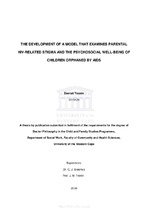The development of a model that examines parental HIV-related stigma and psychosocial well being of children orphaned by AIDS
Abstract
The growing interest in the well-being of children who have been orphaned due to HIV/AIDS is widely reflected in the emerging body of research. Children orphaned by AIDS-related causes are identified as a vulnerable population of youth who display lower levels of psychosocial well-being and experience increased psychosocial distress. While HIV-related stigma remains a salient risk factor hindering the psychosocial well-being of children orphaned by AIDS, the concept remains elusive and poorly understood. Hence, the call for a comprehensive understanding to support an effective response to stigma reduction, and for the systematic identification and response to the psychosocial needs and challenges of children in the context of HIV/AIDS. The overall aim of this study was therefore to develop a model to understand the manner in which HIV-related stigma affects the psychosocial well-being of children orphaned by AIDS. A mixed method, exploratory, sequential design situated within a theory generative research approach was implemented in four sequential phases geared towards model development. The specific objectives of this study were to: (1) review existing literature focusing on the relationship between HIV-related stigma and the psychosocial well-being of children orphaned by AIDS (systematic review); (2) explore children orphaned by AIDS perceptions and experiences of HIV-related stigma (qualitative exploratory design); (3) develop a model that offers an understanding of the manner in which HIV-related stigma affects the psychosocial well-being of children orphaned by AIDS (a theory generative design); and (4) determine the functionality of the developed model through the use of the Delphi technique (a modified Delphi technique).
The systematic review conducted in Phase I indicated the presence of HIV-related stigma, which inhibited the psychosocial well-being of children orphaned by AIDS. The findings further highlighted the mediating role of maladaptive coping strategies and social
support likely to reduce healthy psychosocial well-being and cause psychosocial distress among children orphaned by AIDS. Similarly, the findings arising from the qualitative exploration in Phase II indicated that children orphaned by AIDS were highly perceptive and experienced HIV-related stigma as a result of parental illness and death. These experiences negatively affected the psychological, emotional, and social well-being, self-concept and self-esteem, and future orientation of children orphaned by AIDS. The theory generative design in Phase III identified, classified, and defined six focal concepts upon which the model is based, namely, (1) enacted stigma, (2) perceived stigma, (3) internalized stigma, (4) coping strategies, (5) psychosocial well-being, and (6) interpersonal relations. The developed relationship statements of the model indicated: (1) the bidirectional relationship between enacted, perceived, and internalized stigma; (2) the mediating role of coping strategies; (3) the direct and indirect influences of HIV-related stigma on the psychosocial well-being of children orphaned by AIDS; and (4) the contextual role of interpersonal relationships in which the process of stigmatization may unfold. The modified Delphi technique conducted in Phase IV indicated that the developed model was simplistic, clear, generalizable, accessible, and important for use in research and practice.
The developed model will aid future studies by providing a theoretical lens through which HIV-related stigma and its influence on the psychosocial well-being of children orphaned by AIDS may be viewed. HIV-related stigma should be considered strongly when addressing the well-being of orphaned children, so that tailored programs, interventions, and services may be set in place to effectively bring about the reduction of stigma and ensure the psychosocial well-being of children. The recommendations set out serves to further inform practice and programs and form a baseline for future empirical research focusing on HIV-related stigma and the psychosocial well-being of children orphaned by AIDS.

